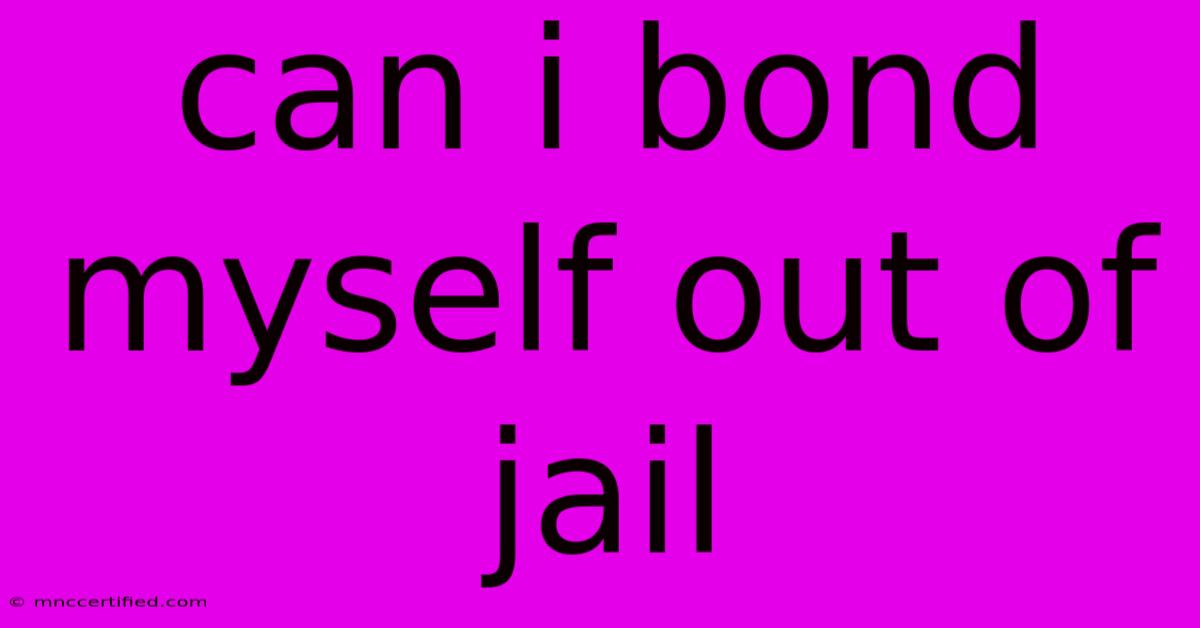Can I Bond Myself Out Of Jail

Table of Contents
Can I Bond Myself Out of Jail? Understanding Bail and Release
Getting arrested is a frightening experience, and one of the first questions that pops into most people's minds is, "Can I bond myself out of jail?" The short answer is: it depends. While you can't literally "bond yourself" in the sense of paying your own bail without involving a bondsman or other legal process, understanding the bail system and your options is crucial. This article will explore the intricacies of bail, the process of release, and whether you can secure your freedom without the help of a bail bondsman.
Understanding Bail
Bail is a sum of money or property deposited with the court to ensure your appearance at future court proceedings. It's not a punishment; it's a mechanism designed to guarantee your presence in court. If you appear for all scheduled hearings, the bail is returned. However, if you fail to appear, the bail is forfeited, and a warrant is issued for your arrest.
The amount of bail is determined by a judge, considering various factors, including:
- The seriousness of the crime: More serious offenses often have higher bail amounts.
- Your criminal history: A lengthy criminal record can lead to a higher bail.
- Flight risk: The judge assesses the likelihood of you fleeing the jurisdiction.
- Your ties to the community: Strong community ties, such as employment and family, can influence the bail amount.
Can I Pay My Own Bail?
Yes, you can absolutely pay your own bail. This is often referred to as "posting bail" or "cash bail." This method requires you to pay the full bail amount in cash or certified funds. Once the court receives the funds, you'll be released. The significant advantage of this approach is that you don't incur any additional fees, and you get your money back upon successful completion of your court appearances. However, it requires having access to a substantial amount of money, which can be a significant barrier for many.
Alternatives to Cash Bail:
If you don't have the funds for cash bail, several alternatives exist:
- Bail Bondsman: A bail bondsman is a private company that will post bail on your behalf for a fee, typically 10-15% of the bail amount. This is a non-refundable fee, meaning you won't get it back. While this allows for release even with limited funds, it comes at a cost.
- Property Bond: In some jurisdictions, you might be able to use a piece of property as collateral for your bail. The property's value must equal or exceed the bail amount. This option requires clear title and can tie up your asset until the case concludes.
- Release on Recognizance (ROR): In certain cases, judges may release you without bail. This usually happens when the crime is minor, and the judge believes you are not a flight risk. ROR is essentially a promise to appear in court.
Factors Affecting Your Release
Several factors influence whether you'll be released before trial:
- The type of crime: Violent felonies or crimes involving weapons will likely result in higher bail and a more difficult release process.
- Your criminal record: A history of failing to appear in court will make it harder to secure release.
- Immigration status: Your immigration status can influence the bail decision.
Seeking Legal Advice
Navigating the bail system can be complex. It's crucial to consult with a criminal defense attorney as soon as possible after arrest. A lawyer can advise you on your options, negotiate with the court on your behalf, and represent your interests throughout the legal process. They can also help you understand your rights and the best course of action.
In conclusion: While you can't directly "bond yourself out" without going through the proper channels (cash bail, property bond, etc.), you have several options for securing your release from jail. Understanding these options and seeking legal representation will significantly increase your chances of a successful outcome. Remember, acting quickly and strategically is key to navigating this challenging situation.

Thank you for visiting our website wich cover about Can I Bond Myself Out Of Jail. We hope the information provided has been useful to you. Feel free to contact us if you have any questions or need further assistance. See you next time and dont miss to bookmark.
Featured Posts
-
Celtic Club Brugge Ucl Live Latest Score And News
Nov 28, 2024
-
Sierra Chart Automated Trading
Nov 28, 2024
-
D B Cooper Fbis Latest Findings
Nov 28, 2024
-
Dee Devlins Message To Her Sons
Nov 28, 2024
-
How To Apply Gold Bond Powder
Nov 28, 2024